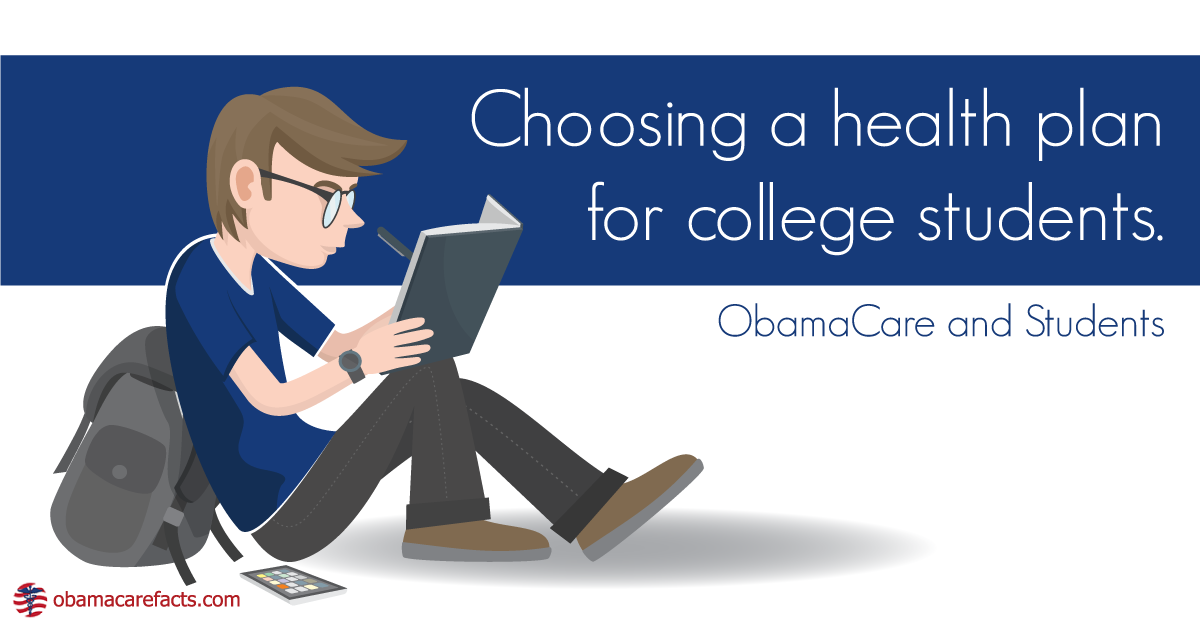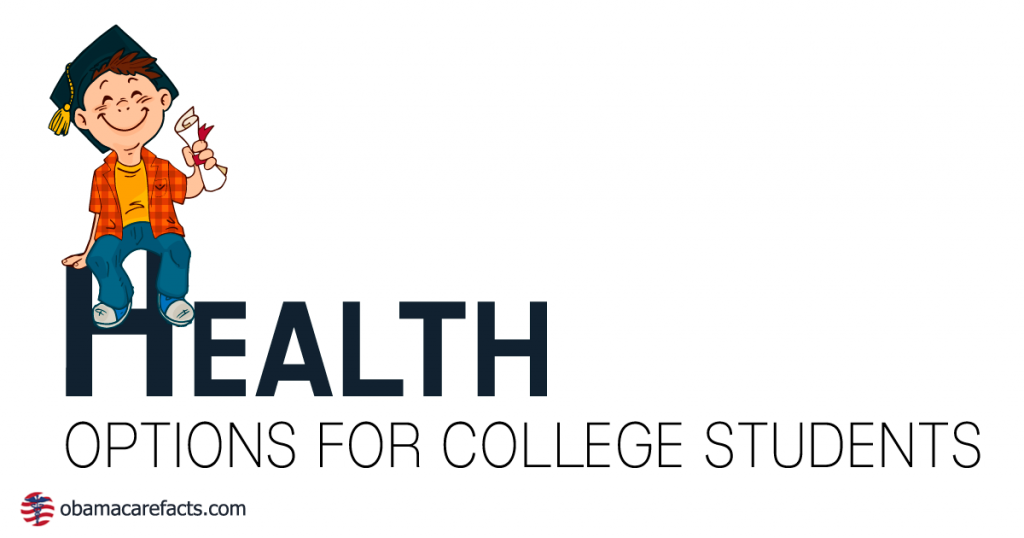Health Plan Options for College Students








College students have a number of health plan options including the Marketplace, Medicaid, school health plans, catastrophic plans, and their parents plan. Below we take a look at student health options under the Affordable Care Act (ObamaCare).
Options are Based on Tax Filing, Employment, and Income
Most students qualify for cost assistance on the Marketplace or Medicaid if they file taxes on their own and don’t file with their parents. This is because cost assistance is based on household income claimed on tax returns for the year assistance is claimed.
Anyone making between 100% – 400% of the Federal Poverty Level in Modified Adjusted Gross Income (MAGI) qualifies for cost assistance on their states Marketplace. In states that expanded Medicaid students with incomes below 138% of the Federal Poverty Level qualify for Medicaid.
TIP: We highly recommend students look at the benefits of Medicaid or Marketplace coverage.
You Must File Taxes To Get Marketplace Coverage
If you get Marketplace cost assistance you are actually getting a tax credit. This means you’ll have to file taxes for the year you claim the credit. You should read up on ObamaCare’s subsidies for a better understanding of how things work before simply taking the full credit upfront.
TIP: We suggest a Silver Marketplace plan with an HSA. Make sure to understand tax credit repayment limits and keep out-of-pocket cost assistance limits in mind to get the most out of your plan. Students claiming between 100% – 250% of the Federal poverty Level qualify for out-of-pocket cost sharing assistance and generous tax credits making that an ideal range of income.
Medicaid Is Smart For Students Who Don’t Qualify For the Marketplace
If you can qualify for Medicaid and the state you are going to school in expanded Medicaid it is a smart bet for students. Medicaid is free or low cost, it won’t always provide the same quality of care in some regions, but it will often provide the cheapest health option for students.

Students Under 30 Qualify For Catastrophic Coverage
Anyone under 30 can buy a catastrophic health plan by contacting the Marketplace. These plans usually have lower monthly premiums but high deductibles. This means you pay for most of your care yourself, up to a certain amount. After that, the insurance company pays its share for covered services. A catastrophic plan is an affordable way to protect yourself from worst-case scenarios, like serious accidents or illnesses, but provides little value beyond that.
Students Under 26 Can Stay on Their Parents Plan
Anyone under 26 can stay on their parents plan. For tax purposes being on your parents plan means no one will owe the fee for you not having coverage, however if you are going to school out of state and your parents don’t have a multi-state plan you could find yourself with no non-emergency health care options outside of your state.
Getting a Student Health Plan
You can also of course simply enroll in a student health plan. The value of this compared to other options differs based on a number of factors, but do make sure to compare this choice to Medicaid and Marketplace coverage as often the advantages of cost assistance are unbeatable.
If you go with a student health plan you should note that only fully insured student health plans have to offer all of ObamaCare’s new benefits, rights, and protections (although they will both protect you from the fee). If that plan doesn’t provide contraceptive services than a third party will administer secondary contraceptive only coverage at no extra charge.
Employer Health Coverage
Keep in mind if you have coverage through an employer you won’t be eligible for Marketplace cost assistance.
You Can Get Marketplace Coverage or Medicaid Even If You Already Have a Student Health Plan
If you have a student health plan you don’t need to wait until it ends to switch to marketplace coverage or Medicaid.
When filling out the Marketplace application, choose “No” when answering whether you currently have health coverage. Choose “No” even if you have a student health plan now and plan to drop it in order to enroll in a Marketplace plan.
What State Should I Get Health Insurance In If I Got To College Out of State?
If you are going to be on a family plan with your parents then you’ll either need a multi-state PPO (which lets you get care anywhere in the country) or you’ll need to live in the state you are going to college in. Even if you live in the state if the college is a ways away you may not have doctors in your network on a more narrow HMO.
If you are getting coverage on your own you should get coverage in the state you are currently residing in and then switch coverage when you move for an extended period of time (for instance you go back home for the summer). You can switch plans via special enrollment if you are moving.
Students Should Get a Multi-State PPO
It’s important for students to understand the difference between an HMO and PPO (read the differences between HMO and PPO here) but in short a PPO typically has a wider network. Some insurers offer a multi-state PPO which allows you to use your plan in multiple states. This can be smart for someone traveling back and forth between states for school.
Shop During Open Enrollment
Students should shop for coverage during open enrollment each year as this is the only time individuals and families can get covered outside of Medicaid, employer insurance, or special enrollment in the Health Insurance Marketplace. If a student will move during the year it will qualify them for special enrollment.
Losing a Student Health Plan
If a student loses their school health plan for any reason other than non-payment they may qualify for a special enrollment period to enroll in Marketplace coverage.
Special Enrollment For Students
If a student loses a health plan or moves they qualify for special enrollment in the Health Insurance Marketplace. Just keep in mind that cost sharing is based on the calendar year and money you pay into one plan won’t carry over to the next.
Do Students Who Don’t Get Coverage Owe the Fee?
Every American must obtain coverage or an exemption. If you file taxes for yourself then you’ll owe a monthly fee on your federal income taxes for not obtaining and maintaining coverage throughout the year. If your parents file with you as a dependent then they will owe the fee on your behalf if you don’t get coverage.
What Student Health Options Qualify As Minimum Essential Coverage?
All options mentioned on this page including Marketplace coverage, major medical coverage outside the Marketplace, Medicaid, employer coverage, catastrophic coverage, and student health plans all count as minimum essential coverage. As long as you obtain minimum essential coverage or an exemption you won’t owe the fee for not having coverage.
Short Term Health Insurance For Students
Students should keep in mind short term health insurance or other limited benefit temporary coverage like travelers insurance doesn’t count as minimum essential coverage and won’t protect them from the fee.
Students Going to School Outside of the US
If you are going to school outside of the US, but are a US citizen or resident alien, you’ll need to maintain coverage or an exemption throughout the year. As a rule of thumb if you spend 330 days out of the country in a 12 month period or more you qualify for an exemption. If you file taxes in the US you are required to obtain and maintain coverage.
Foreign Students Going to School in the US
If you are going to school in the US and will be filing a tax return in the US then you’ll need to obtain and maintain coverage or an exemption throughout the year or pay a fee. This is true unless you spend 330 days out of the country in a 12 month period or more